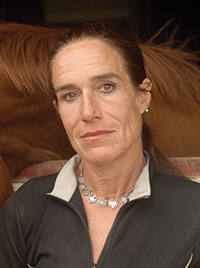poems by
Julia Wendell
Poetry book, 76 pages, cover price $14
ISBN: 978-1-59948-459-4
Release date: May 20, 2014
OUT OF STOCK
$14.00
Out of stock
Poetry book, 76 pages, cover price $14
ISBN: 978-1-59948-459-4
OUT OF STOCK
 Julia Wendell
Julia Wendell
Julia Wendell grew up in the Allegheny Forest of northwest Pennsylvania. Educated at Cornell University, Boston University, and the University of Iowa, Writer’s Workshop, she left her mid-careers as teacher and editor for the world of horses and three-day eventing. Her children John Logan (a classical sitarist) and Caitlin Saylor (an actor/playwright), grew up with their mother and her husband, poet and critic, Barrett Warner, on their horse farm in northern Baltimore County, where Julia and Barrett still live and work. Julia is enamored of jumping horses over immovable obstacles while galloping cross country.
Don’t be fooled by the delicious-sounding recipes that open each section of Julia Wendell’s startling new collection, Take This Spoon. This is not a book about cooking, although food is both her inheritance and her obsession. These are poems about the ingredients that go into the making of a life—in this case, that of a woman whose struggles with anorexia and addiction have taught her how to use language as the “pinch of salt” that brings out the flavor—tart and poignant—for the reader. As I joined Wendell on her cook’s tour of what it means to be a mother and a daughter, I caught whiffs of Louise Glück and Jane Kenyon. Who can blame me for devouring the entire book in a single sitting?
–Sue Ellen Thompson,
winner of the 2010 Maryland Author Award and
editor of The Autumn House Anthology of Contemporary American Poetry.
Julia Wendell’s Take This Spoon is an absolutely ingenious collection, melding recipes for the kitchen with poems reflecting upon family life—and it’s nothing less than delicious. The shifting constellations of parents and children, the insistent place of food in our domestic dynamics, all of the fruits of the earth and the fruits of our families, these are the currency of Julia Wendell’s exciting and moving new book. The conversational ease of these poems allows us a truly remarkable intimacy with the poet. Trust me; this is a book to read slowly, savoring every page.
–David St. John
Each luscious recipe in this equally edible and biting poetry collection is a chapter metaphor, serving anorexia and addictions with delectable meals, a family heritage where the ultimate comfort activity is spiced with discomfort—like Wendell’s art, which tantalizes with sensual description—and sears with honesty and self-implication, which emulsify to a satisfying blend of self-acceptance, wisdom, and emergent serenity: “It’s the whipping/and the chill to follow—/shaving the dark,/square block into chocolate flakes,/blizzarding the tongue/of our sweet, short winter.”
–April Ossmann
Pot-holdering a cloud
of toasted soufflé,
its voluptuous body
billowing over the dish,
we kept its infallible, flawless secret,
referencing the butter-
stained recipe card
by memory only.
Teamwork, we’d wink to each other—
and lots of stirring—never revealing
what separated mother and daughter
from our guests’ amazement
at this seeming perfection—
fleeting, and only as good
as our shortcut:
a bitter white powder lodged
in a glass spice jar
that doubles in volume without fail
what it starts with, transforming
impossible into easy.
was her signature musk-mint
I hid behind, counting mallards: 35, 36, 37—
my mother calling to me across Applebrook’s pond,
counting her ducklings—three of us,
bustled into the station wagon,
bound for our northern home
where the green, waxy bush couldn’t grow.
I spy something with my own little eye—
my father leaned into my small shoulder—
something that begins with B—
and I believed him.
Who planted it at grandmother’s graveside,
as if she could be reduced to a single something—
photograph, recipe, poem—or a bush
to signify and flourish
just above the surface of memory.
A cut from paper’s edge,
razor-sharp and shocking—
it took six years
for the blood
to rise to the surface,
seep its way out.
First, she teeters downstairs
on Father’s thin arm
in a floor-length Mary Jane,
tenting what is left
of her spent body.
Then, she floats
from her auditorium seat
in a red taffeta gown,
lifting its voluptuous skirts
up the few short steps
to the Steinway.
I rip a piece of paper towel
to blot the sliver wound,
as Granados’s nightingale
trills its way out of my flesh
just as it did from the raised,
dark hood, forty years ago,
just as she rises within me.